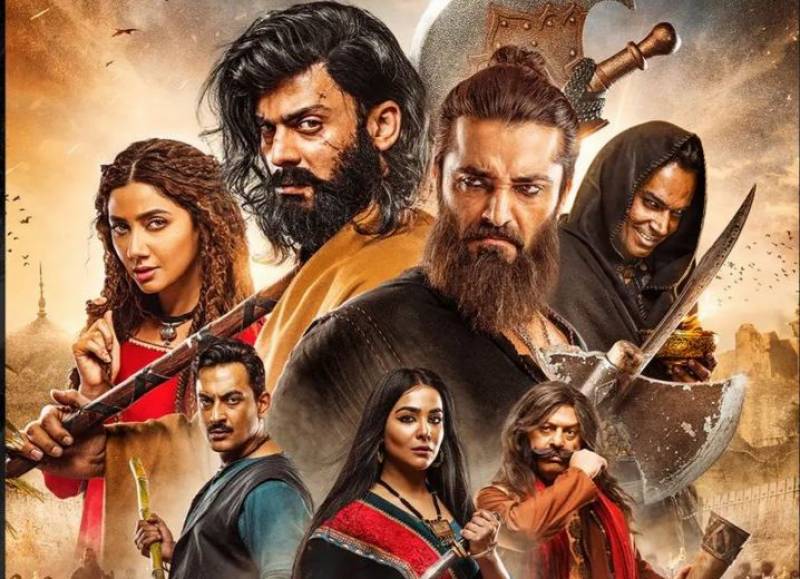It has been a while since a Pakistani film has created this kind of buzz. Not only have Pakistani fans been waiting for years, but fans all over the world have been showing interest as well. “The Legend of Maula Jatt” is originally a Pakistani Punjabi film directed by Yunus Malik and starring Sultan Rahi and Mustafa Qureshi. Released in 1979, the film was not only a success then, but has gained cult classic status over the years. In 2013, director/writer Bilal Lashari and producer Ammara Hikmat joined hands to create this updated reboot of the film. Starring Fawad Afzal Khan, Hamza Ali Abbasi, Mahira Khan, Humaima Malik, Faris Shafi, Gohar Rasheed, Saima Baloch, Ali Azmat and others in prominent roles, this is a star-studded affair. Having already watched the film, the years of waiting has been worthwhile! Here are the top 5 reasons (amongst others) “The Legend of Maula Jatt” is a must-watch!
1) Production Values
It would not be a stretch to say that “The Legend of Maula Jatt” is on-par with not only Bollywood, but also Hollywood films. After a long time, this is a Pakistani film that looks and feels like a film (rather than a condensed drama for the big screen). The story is the same revenge tale of the past (as is expected from a remake), but it’s the presentation and execution that grips the audience from the very first scene.
2) Fawad Khan and Hamza Abbasi’s Face Off
When it comes to actors who have the star power to command attention on the big screen, who better than Fawad Afzal Khan and Hamza Ali Abbasi? These are two men who are well-known for their acting abilities and charisma. However, this time around, both are portraying characters incredibly different from those they’ve played in the past – and they succeed! Fawad Khan’s Maula is not the quintessential hero – he’s almost animal like, a man often in a drunken stupor….and yet, it’s Fawad’s portrayal of this injured soul that makes him root-worthy. Of course, Hamza Ali Abbasi’s Noori Nath is a terrifying character, one that holds the viewer’s attention. Hamza is to “The Legend of Maula Jatt” what Amjad Khan is to “Sholay” – a scene stealing villain who wins the audience over with that strong, booming voice. And when Maula and Noori come together, the screen is set on fire with their face-off. Their scenes together are the highlight of the film!
3) Humaima Malick and Mahira Khan As Strong Female Leads
Humaima Malick is the true female lead of this story and what a lead she is. Daaro is not a sitting duck. She is a strong woman in a man’s world, a woman born to lead and fight head-on with the men around her. Humaima Malick is a wonderful actor and her performance only reminds us that we’d love to see more of her – and hope she decides to return to acting. Mahira Khan’s Mukkho is essentially an extended special appearance, but she adds romance and comedy in an otherwise intense story. She is the light in Maula’s life and she puts a smile on our face, particularly her chemistry with Fawad Khan. She’s a woman who knows what she wants and does not care to follow societal norms. Is Mahira’s Punjabi flawed? Yes. Is it enough to complain about? The Fawad and Mahira chemistry makes it easy to overlook. Their chemistry is unmatched and Maula and Mukkho’s scenes just remind us that we need more of this beautiful pair.
4) A Stellar Supporting Cast
There aren’t any actors who have been cast here based on connections. These are actors who fit their roles like a glove. From Faris Shafi’s humorous, enjoyable performance as Mooda, Gohar Rasheed’s sinister portrayal of Maakha, Ali Azmat’s strong Gogi or Saima Baloch’s haunting Rajjo, each actor is perfect for their character. There are some special appearances that also set off cheers. This is a stellar ensemble cast!
5) A Truly “Pakistani” Film
Many Pakistani films in recent years have struggled to find their identity. While some have followed the Bollywood path, complete with song and dance (which isn’t necessarily a negative), others have tried to delve into more modern, Hollywood-esque concepts. And while “The Legend of Maula Jatt” takes place in a world that is fantasy, a Pakistan that doesn’t really exist as portrayed on-screen (as a cousin humorously quipped, “In what Pakistan do men and women sit in bars together?”), the story being told feels, at heart, Pakistani. This film holds true to its identity with its earthy tale, larger (and louder) than life Punjabi dialogues, traditional costumes and even an oddly realistic “mujra.” There isn’t anything “relatable” about “The Legend of Maula Jatt,” but it feels like home.
If this film is playing anywhere in the vicinity, run, don’t walk, and watch it! As an audience, we should do our part to support the Pakistani film industry, especially when it’s a quality film.
